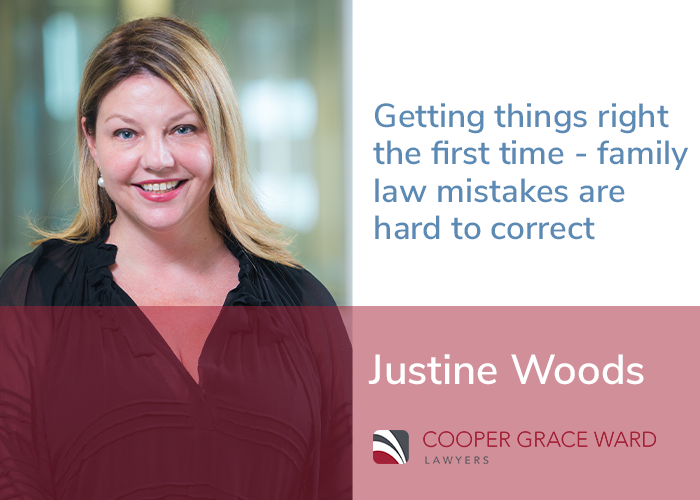In this video, family law partner Justine Woods talks about the importance of getting things right the first time – as there are very few second chances in family law.
Video transcript
Hello, hello, everyone. I’m Justine Woods. I’m the family law partner at Cooper Grace Ward
How to run a case
Now, today, I thought I would talk to you about how there are very few second chances in family law. Of course, there is the misery of an appeal. That is, you have a set of orders made by a judge. One person, or potentially both, are unhappy with the outcome and appeal it. We’ve talked about appeals in other videos. Today, this is really about how to actually run the case because the outcome is going to be very much influenced by what you do from the very beginning. So, we don’t always get the ideal arrangement, but if you can in advance of separation, it’s a very good idea to have some advice. Because there are some things that I cannot correct for you if they’ve already been put in place, or it’s terribly difficult to correct them.
Scenario of a separation
So, for example, sometimes people present months after separation. There’s been, for example, a shared care arrangement put into place for children, or they’ve agreed, and this is more common than you might think, to allow the other person to come over three or four nights a week. And they’re not they don’t often considering reconciliation, but the other person comes home, spends dinner time with the children, does their homework, etc., then leaves and goes back to their now separate residence. Or in a financial matter, for example, one person has paid overly, in my view, on the numbers of their case, overly generous spousal maintenance or too little child support, for example. Now you can add things. It’s very hard to subtract things. So, if you pay much too high or you’re much too generous, or you enter into some kind of arrangement, like nesting, for example, was very fashionable for a while with parents moving in and out and the children stay there. That can work, but it’s fairly horrific in practical terms for people to manage. If that’s in place, for example, and you’ve implemented, for example, the shared care arrangement. So difficult to then say that doesn’t suit me anymore. Or the other person’s moved away and you’ve done nothing about it for months and months and you think, oh no, I’m really not happy they’ve moved to country New South Wales – very difficult months later to do too much about it because you’ll be seen to have acquiesced in that decision. So, sometimes timing is incredibly important. And I think also if errors are made, now, they might be your errors, but they might also be the lawyer’s error, you will be held to that.
Case of Eden
And there’s a recent case that of Eden, which is not remotely like paradise, where the judge made the observation and it’s not a new one, that the parties are bound by the way in which they conduct their case. So, in that case, the male de facto had made a concession that their relationship had broken down before 1 March 2009, which is the date at which the Family Court system federally was given jurisdiction over de facto matters. And then they had reconciled and continued in a de facto relationship until 2015. So, that was the preliminary concession that he made. He then was opposing a property settlement, and then there was a series of hearings about whether jurisdiction did or did not exist. And finally, on appeal, the judge effectively said, well, it’s too late now, the husband has made that concession. He made it at the trial. He repeated at the appeal. And the appeal judge even commented he made that concession without really seeming to understand its significance. But he was still held to it. Had he been more, now, depending on the facts of the case, that concession mightn’t have been required, he might not have really meant it at all. But he was held to it.
Examples of different parenting matters
The same, there are cases, for example, where in a parenting matter, one parent at the end has said, well, I actually think there should be injunctions made against physical discipline or they should be continued supervised time. And the judge flicks back to the very original material and says, at no point has the applicant ever sought those sorts of orders, so I’m not imposing them now. If you, for example, reach consent orders and you’ve got all of these concerns about the children, but you just want it over and done with. The consent orders are made. Unless you can establish a very substantial change in circumstance, you won’t even be able, it will be extremely difficult to have the court even examine that issue again because you haven’t met the threshold. So, as difficult as it is, every decision has to be carefully weighed because it will have profound influence on the ultimate and ongoing outcome in your family law matter.
So, if you’d like to discuss that or any other family issue, you’re most welcome to contact us here at Cooper Grace Ward.





